NetSuite is one of the most well-known ERP systems in the market. It’s used by companies across different industries to manage everything from finance and inventory to sales and operations, all in one cloud-based platform.
But while NetSuite works well for many, it’s not always the best fit for every business. Some users find it too complex, too expensive, or simply not aligned with their company’s structure and growth stage.
If you have simpler workflows, tighter budgets, or need local support, NetSuite can sometimes create more friction than value. That’s why many teams in the Philippines are looking for alternatives that offer more flexibility, faster setup, or better ROI.
This article will walk you through 12 of the best NetSuite alternatives available in the Philippines, so you can find the right solution for your team, goals, and budget.
Key Takeaways
|
Table of Contents
What is NetSuite ERP?
NetSuite is a cloud-based software platform that brings together multiple business functions, including ERP, CRM, inventory, accounting, and e-commerce. It’s commonly used by companies looking to manage these areas within a single system and can connect with a wide range of other tools and processes.
NetSuite brings together data from different parts of a business into one system, creating a structure that supports the use of AI. Its built-in AI features help automate certain tasks, provide suggestions, and highlight useful insights to support decision-making.
Features of NetSuite ERP
NetSuite ERP helps businesses automate key processes, improve visibility, and manage resources more effectively. How does the system do that? Here are some of the features and modules that NetSuite System has:
- Accounting: Simplifies general ledger tasks, manages payables and receivables, and offers a clear view of financial health.
- Financial Management: Speeds up transactions and closing activities while maintaining compliance and providing real-time financial data.
- Performance Management: Centralizes budgeting, forecasting, reconciliation, and reporting to support organization-wide planning.
- Inventory: Automates inventory tracking and restocking to balance costs and delivery goals across locations.
- Order Management: Reduces delays and errors by automating the process from sales to fulfillment and invoicing.
- Supply Chain: Improves the movement of goods by simplifying coordination across production, storage, and delivery points.
- Procurement: Centralizes purchasing to control costs, improve supplier performance, and keep communication clear across procurement stages.
Pros and Cons of NetSuite ERP
NetSuite is a popular ERP platform used by companies around the world. But before deciding if it’s right for your team, it’s important to understand both the benefits and challenges that come with it. Below, we break down the key pros and cons to help guide your decision.
Pros of NetSuite
We’ll start with the main advantages of using NetSuite, then continue with areas that businesses may want to consider more carefully.
- Comprehensive all-in-one platform: NetSuite covers a wide range of business functions—financials, CRM, inventory, e-commerce, and more—within a single system. This centralization can help reduce reliance on multiple disconnected tools.
- Real-time data and reporting: Dashboards and reports are updated in real time, offering immediate visibility into key metrics. This supports faster decision-making across departments.
- Cloud-based accessibility: As a cloud platform, NetSuite can be accessed from any location. This is especially helpful for teams with remote or multi-branch operations.
- Scalable for growth: NetSuite is designed to support growing businesses. Whether you’re adding users, expanding into new regions, or opening subsidiaries, the platform can accommodate those changes.
Potential Drawbacks of NetSuite
Every system has its trade-offs. Below are a few limitations of NetSuite that are worth keeping in mind before moving forward. Here are some of NetSuite’s potential drawbacks according to TMC:
- High and increasing cost over time: NetSuite is often considered one of the more expensive ERP options. While initial discounts may be offered, renewal costs can be significantly higher, especially as more users or modules are added.
- Limited flexibility in license downgrades: It’s relatively easy to scale up: adding users or modules, but scaling down is more difficult. License reductions can usually only be done during contract renewal, which may be locked in for multiple years.
- Customer support and training limitations: Ongoing training isn’t always available beyond the onboarding phase. Some users end up relying on third-party partners for support, which may lead to inconsistencies in service.
- Complexity for smaller teams: With its many features, NetSuite can feel overwhelming for small or midsize teams. Businesses with simpler needs may find the learning curve steeper than expected.
- Partner channel conflicts: Some users and resellers have reported challenges working with NetSuite’s internal sales teams, including situations where leads were redirected or deals were over-promised to close quickly.
Some of these issues have been raised repeatedly in various NetSuite review posts, especially by users who struggled with pricing or long-term support.
12 Best NetSuite Alternatives in the Philippines
If you’re exploring NetSuite alternatives or looking for a more flexible ERP system for your business, this list is for you. Here are 12 of the best NetSuite alternatives in the Philippines that you can consider based on the features, strengths, and weaknesses..
1. HashMicro ERP Software
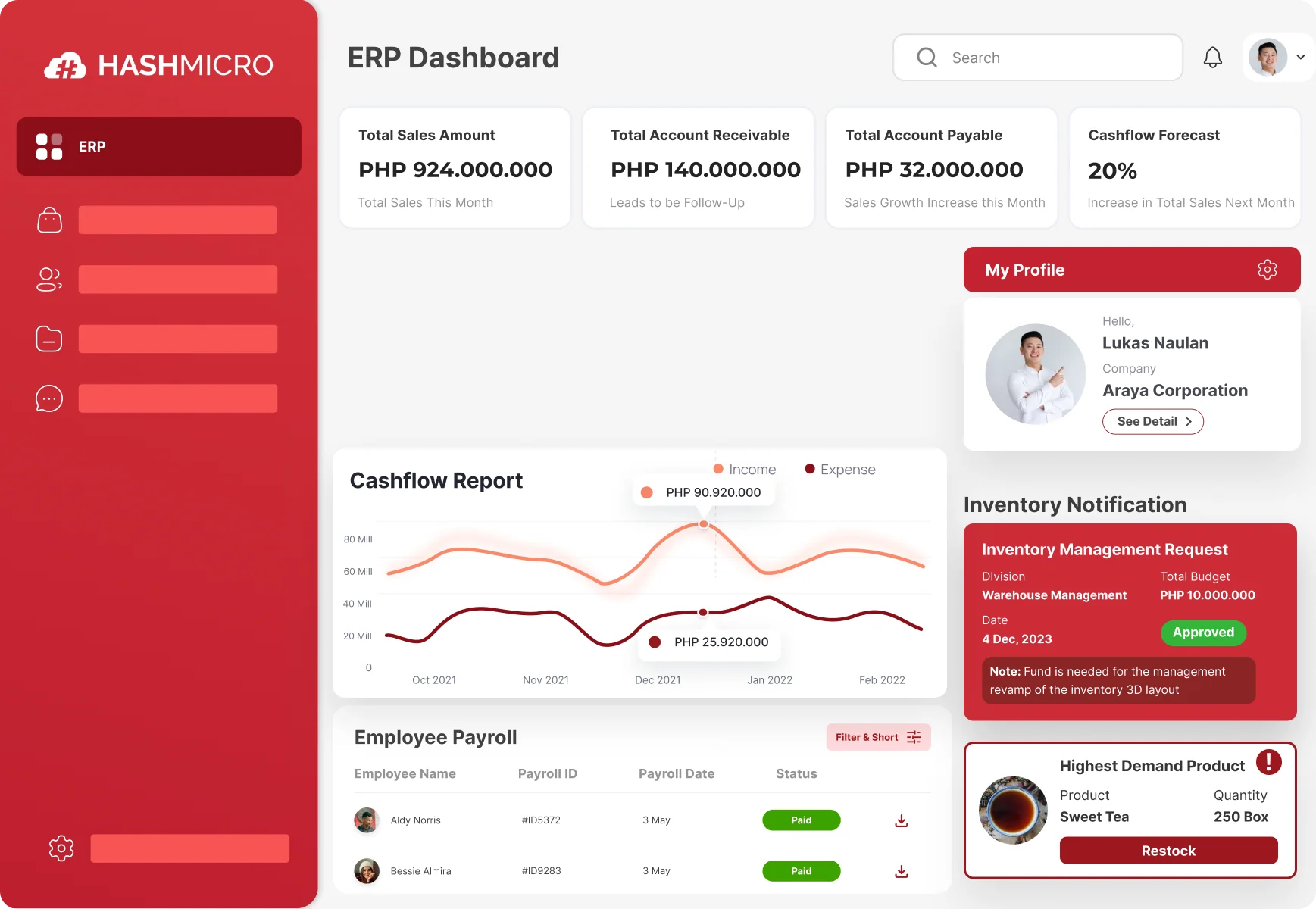 A top NetSuite alternative in the Philippines is HashMicro ERP Software, a trusted business solution provider across Southeast Asia. Unlike platforms with rigid pricing and bundled features, HashMicro offers a modular system, so you only pay for what you need and can scale anytime.
A top NetSuite alternative in the Philippines is HashMicro ERP Software, a trusted business solution provider across Southeast Asia. Unlike platforms with rigid pricing and bundled features, HashMicro offers a modular system, so you only pay for what you need and can scale anytime.
HashMicro brings together accounting, inventory, procurement, sales, and more in one customizable system. And thanks to its user-friendly design, your team can adapt quickly without needing months of training.
It’s also built for Philippine businesses, with BIR-compliant invoicing, local tax support, and workflows tailored to your needs. Plus, you’ll get responsive local support, ongoing training, and a free consultation to see how it fits your operations before committing.
HashMicro Modules:
- Accounting: Handle BIR-compliant invoicing, cash flow tracking, and reconciliation—all in one place.
- Inventory Management: Monitor multi-location stock in real time, with barcode support and smart auto-reorder.
- Procurement: Compare vendor quotes, manage budgets, and streamline your purchase process from end to end.
- HRM & Payroll: Generate DOLE-compliant payslips, auto-calculate SSS, PhilHealth, Pag-IBIG, and empower employees with a self-service portal.
- CRM & Sales: Track leads, create and approve quotes, and stay on top of follow-ups without the manual chase.
- Warehouse Management: Simplify picking, putaway, and stock movement with real-time updates and optimized workflows.
- AI Features: Get smart insights on inventory, sales, and finance, like having a built-in business analyst.
| Pros | Cons |
|
|
Not to mention that HashMicro is completely in-house with a dedicated support team that’s ready to help businesses with their inquiries anytime they need. And as the pricing is upfront yet varied depending on which modules a business might use, you can click on the pricing banner below to get a customized quote.

2. Sage Intacct
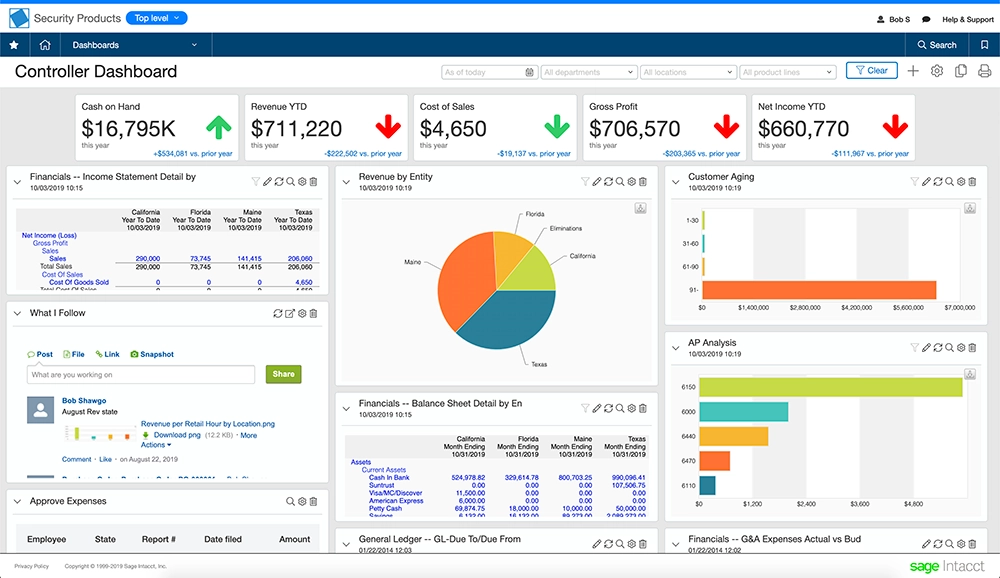 Sage Intacct is a cloud-based financial management platform designed to support advanced accounting functions, deliver real-time insights, and automate key financial processes to help maintain accuracy and efficiency.
Sage Intacct is a cloud-based financial management platform designed to support advanced accounting functions, deliver real-time insights, and automate key financial processes to help maintain accuracy and efficiency.
A key advantage of Sage Intacct is its flexibility, as it lets businesses choose from various modules to create a setup that aligns with their specific financial needs.
However, while its licensing costs are generally lower than NetSuite’s, Sage Intacct is focused solely on financial functions and lacks broader operational capabilities. Because of this, it’s typically not classified as a full ERP system like NetSuite.
Features:
- Ledger management
- Payables tracking
- Receivables monitoring
- Cash flow control
- Advanced reporting
| Pros | Cons |
|
|
3. SAP Business One
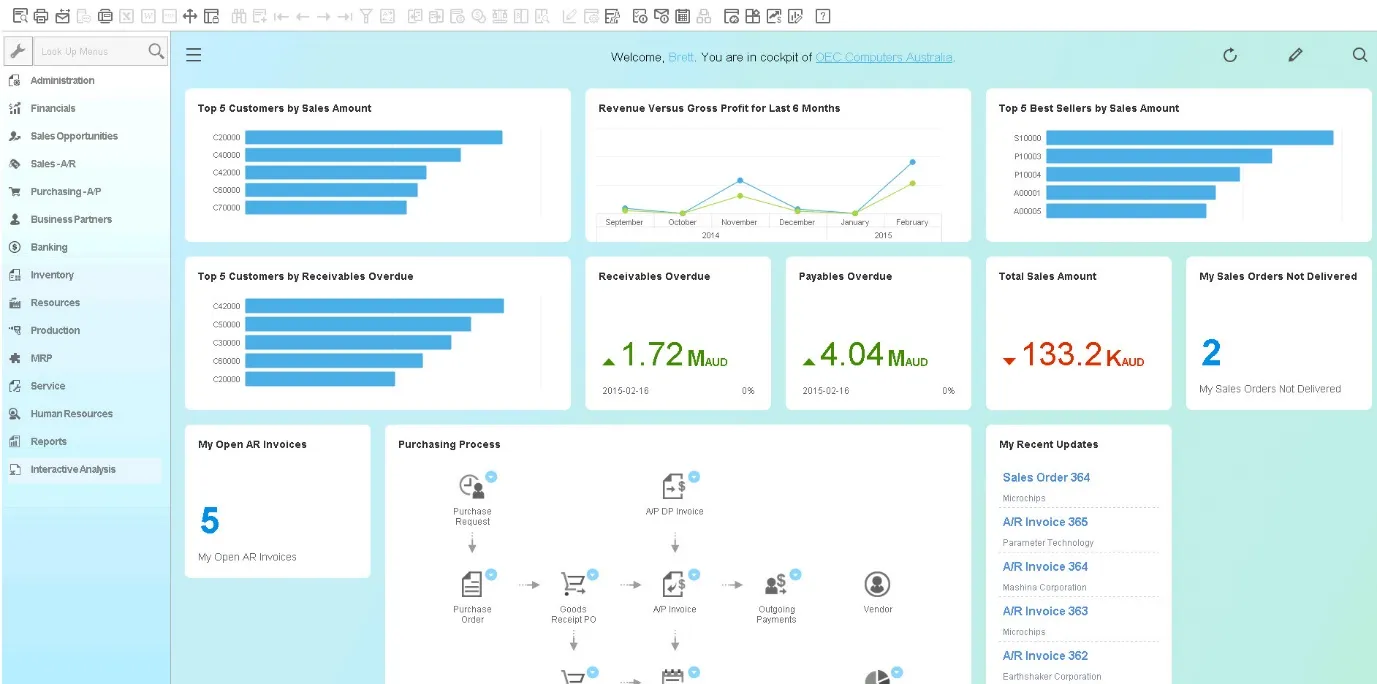 SAP Business One (SAP B1) aims to serve small to mid-sized businesses, including the smaller branches of large enterprises.
SAP Business One (SAP B1) aims to serve small to mid-sized businesses, including the smaller branches of large enterprises.
Unlike NetSuite’s purely cloud-based model, SAP B1 follows a client-server setup that runs on Microsoft Windows and connects to a back-end server. It’s also available on mobile (iOS and Android), though with limited features.
SAP B1 can run on Microsoft SQL Server (Windows) or SAP’s own HANA database (Linux), giving companies flexibility based on their IT environment. While originally built for small businesses, it now targets the mid-market, often competing directly with NetSuite.
Features:
- Financial management
- Sales and customer management
- Purchasing and inventory control
- Production planning
- Project management
| Pros | Cons |
|
|
4. Microsoft Dynamics 365
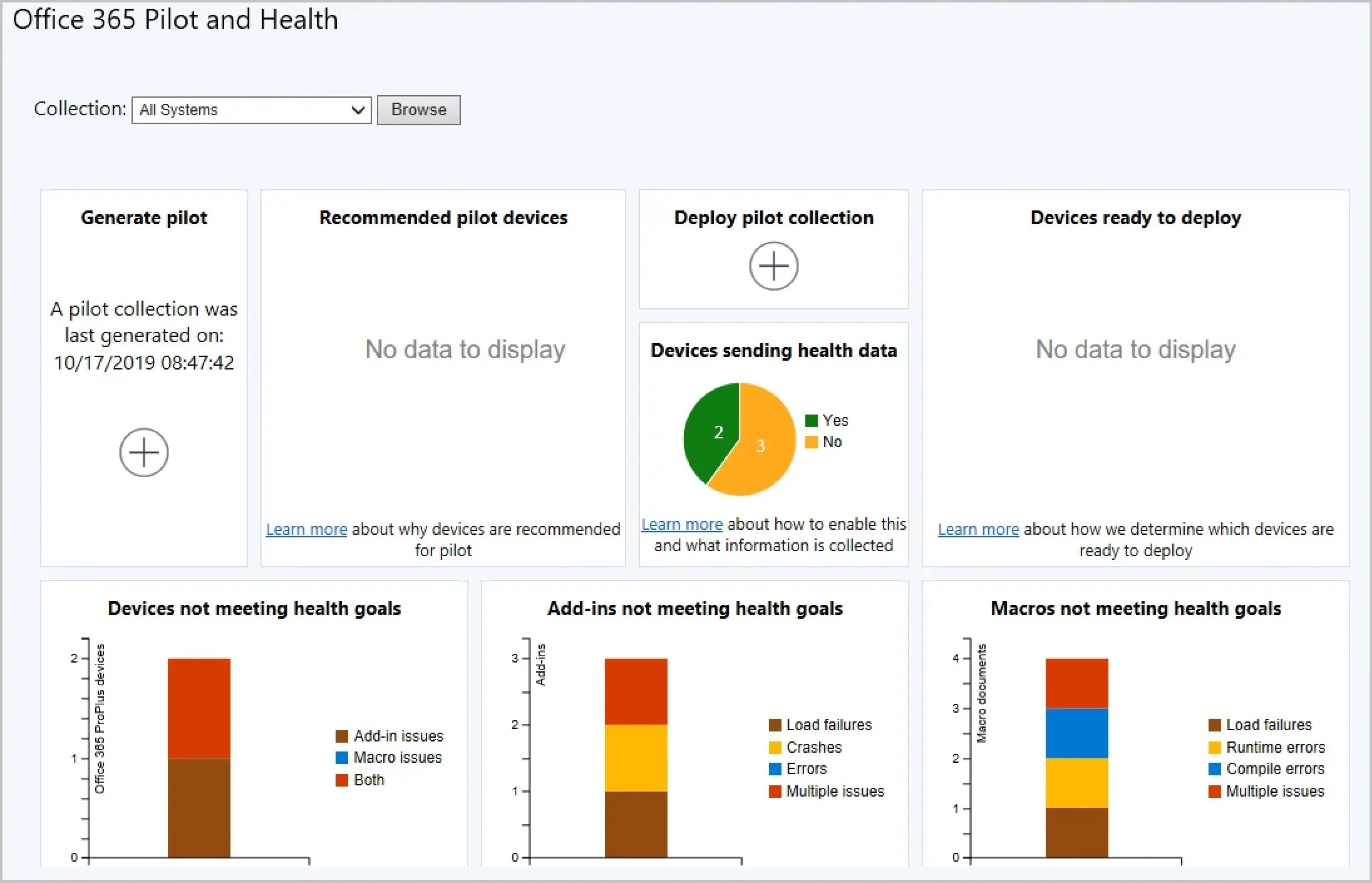 Microsoft Dynamics 365 is a cloud-based platform introduced in 2016 that combines ERP and CRM tools. It’s designed to help businesses handle day-to-day operations, strengthen customer relationships, and support business growth.
Microsoft Dynamics 365 is a cloud-based platform introduced in 2016 that combines ERP and CRM tools. It’s designed to help businesses handle day-to-day operations, strengthen customer relationships, and support business growth.
The system includes different apps for managing finance, sales, marketing, customer support, on-site service, and supply chain activities—all in one connected platform.
As an alternative to NetSuite, Dynamics 365 offers strong flexibility with modular apps, so businesses can start with what they need and expand later. It also integrates well with other Microsoft tools like Excel, Teams, and Outlook, which can be a plus for companies already using Microsoft products.
Features:
- Hosted in the cloud
- Real-time sales visibility
- Supports on-site service teams
- Works well with Microsoft tools
- Intelligent search functions
| Pros | Cons |
|
|
5. Workday
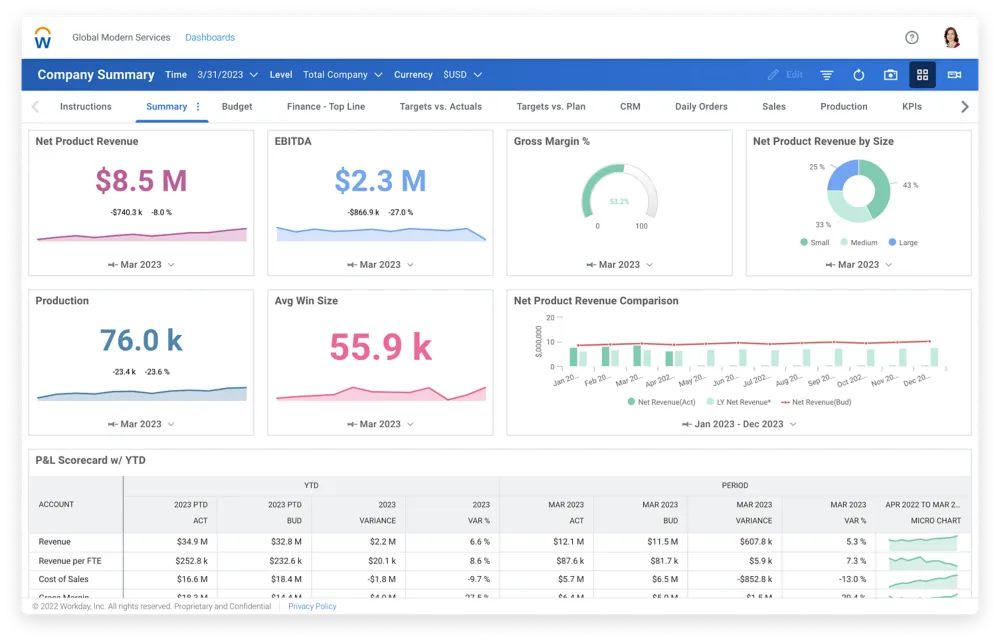 Workday is a modern cloud-based ERP platform that helps companies manage finance, human resources, and business planning in one system. It offers real-time access to key data and performance trends, helping teams make quicker and more informed decisions.
Workday is a modern cloud-based ERP platform that helps companies manage finance, human resources, and business planning in one system. It offers real-time access to key data and performance trends, helping teams make quicker and more informed decisions.
Workday can be a strong alternative to NetSuite, especially for organizations that place a high focus on HR and financial planning. Its strength lies in workforce management and analytics, making it a good fit for companies with complex HR needs.
Features:
- Workforce management
- Finance operations
- Tracking hours and schedules
- Data insights and reports
- Supports various system connections
| Pros | Cons |
|
|
6. Certinia
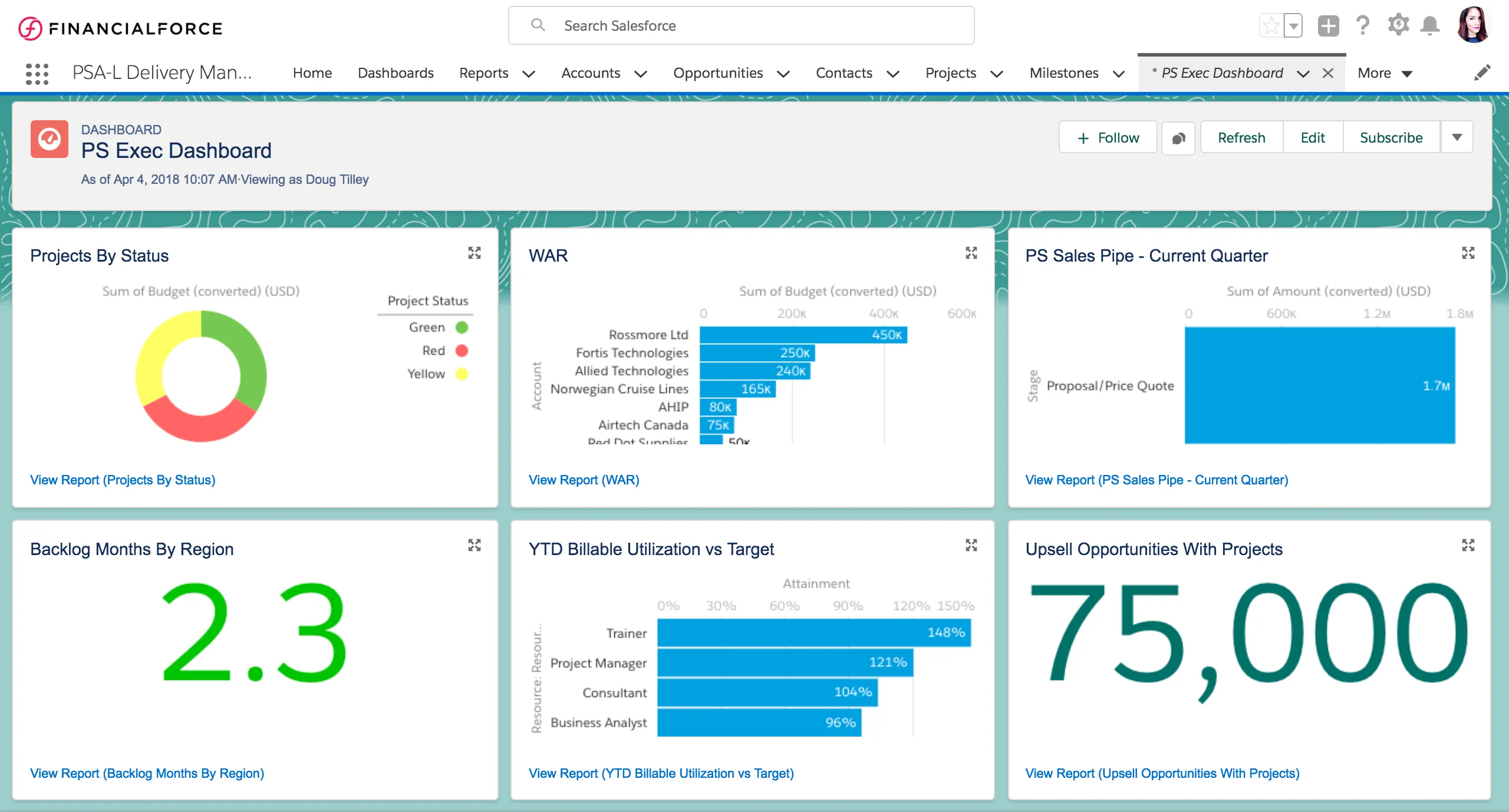 Certinia, previously called FinancialForce, is an ERP and professional services automation (PSA) tool built directly on the Salesforce platform.
Certinia, previously called FinancialForce, is an ERP and professional services automation (PSA) tool built directly on the Salesforce platform.
Because of this, it works very well for businesses that already use Salesforce, making it easier to share data between teams like sales, finance, and project management without needing extra integrations like you often do with NetSuite.
While NetSuite is built for many types of businesses, Certinia focuses more on companies that sell services.
Features:
- Bookkeeping task
- Billing clients
- Expense planning
- Tracking financial records
- Project oversight
| Pros | Cons |
|
|
7. Infor
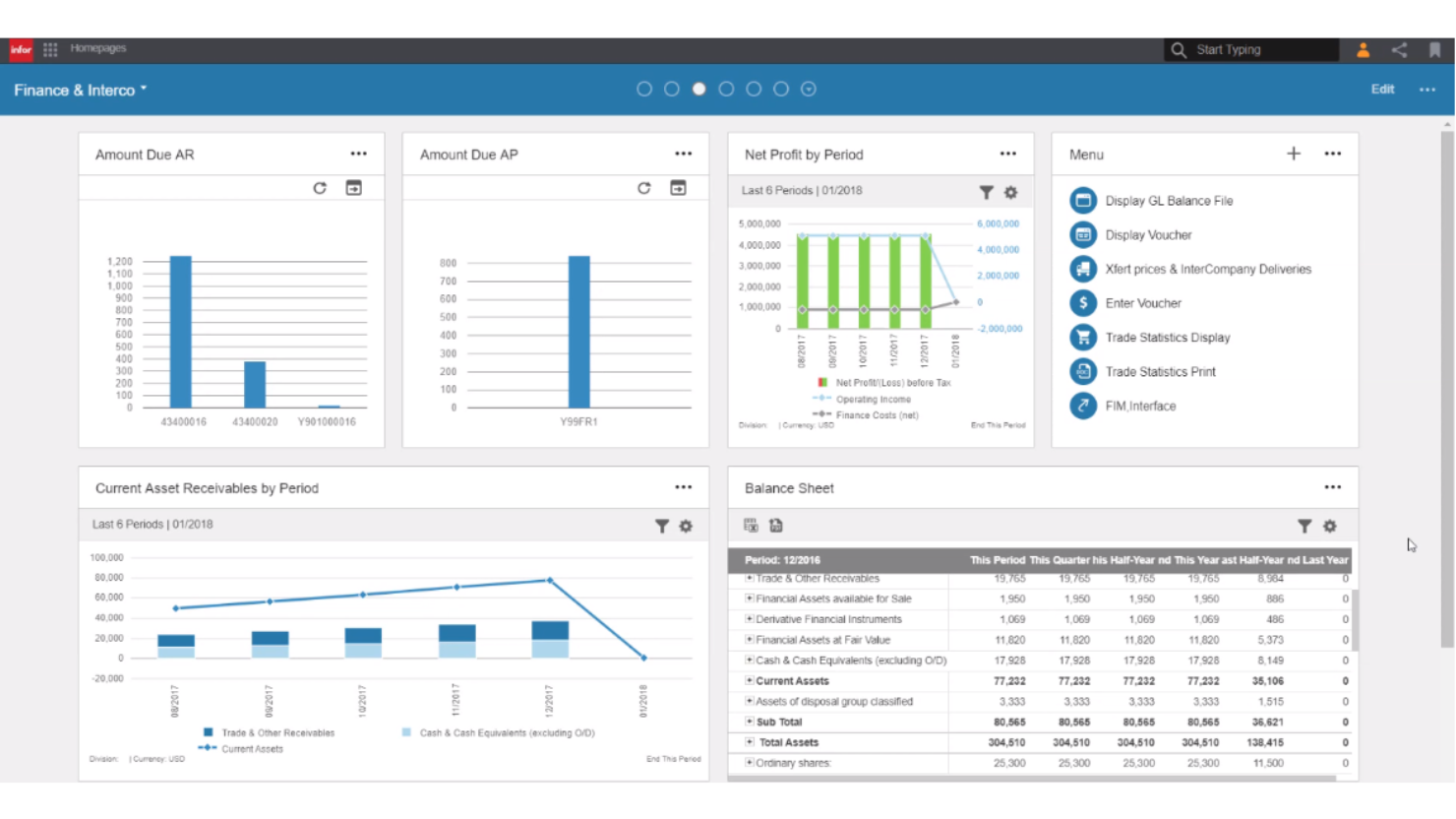 Since its launch in 2002, Infor has become a key player in industry-specific enterprise software, especially for sectors like manufacturing, healthcare, hospitality, and retail.
Since its launch in 2002, Infor has become a key player in industry-specific enterprise software, especially for sectors like manufacturing, healthcare, hospitality, and retail.
Compared to NetSuite, which offers broader ERP functions but limited native asset management features, Infor EAM stands out for its deep focus on asset-intensive operations. It offers more advanced tools for managing equipment life cycles.
Features:
- Asset tracking
- Maintenance scheduling
- Stock control
- Purchasing processes
- Task and work orders
| Pros | Cons |
|
|
8. Acumatica
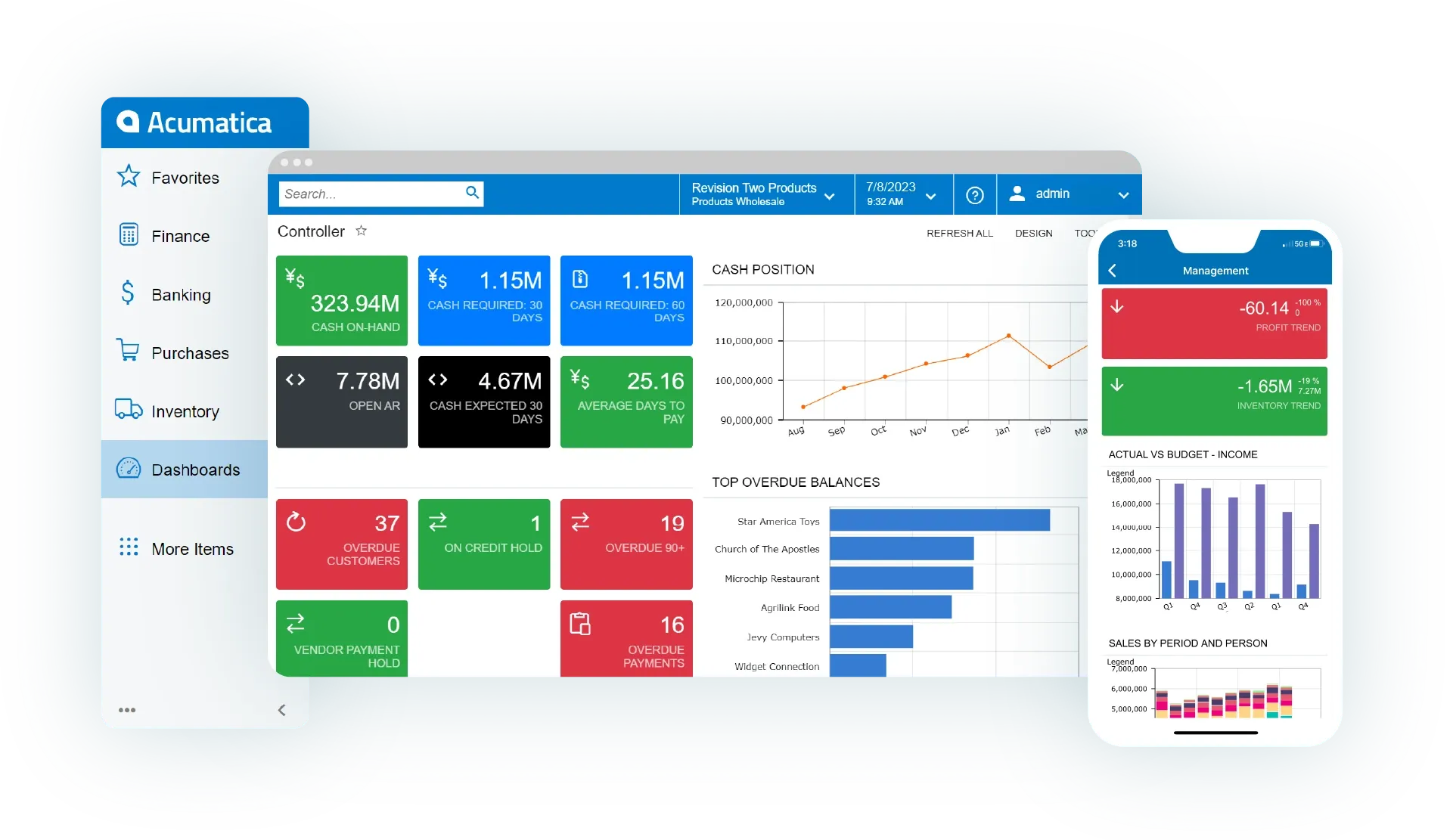 Acumatica is a privately-owned ERP provider that often attracts small to mid-sized businesses by offering a pricing model based on transaction volume instead of per-user fees. It also gives customers the flexibility to choose between a cloud-based setup or an on-premise installation.
Acumatica is a privately-owned ERP provider that often attracts small to mid-sized businesses by offering a pricing model based on transaction volume instead of per-user fees. It also gives customers the flexibility to choose between a cloud-based setup or an on-premise installation.
As an alternative to NetSuite, Acumatica provides basic coverage across key functions, but lacks the advanced capabilities found in larger ERP platforms. It offers limited CRM features, mainly focused on contact management, whereas NetSuite includes a full CRM suite.
Features:
- Financial management
- Customer management
- Project tracking
- Billing and invoicing
- Time and expense tracking
| Pros | Cons |
|
|
9. Epicor
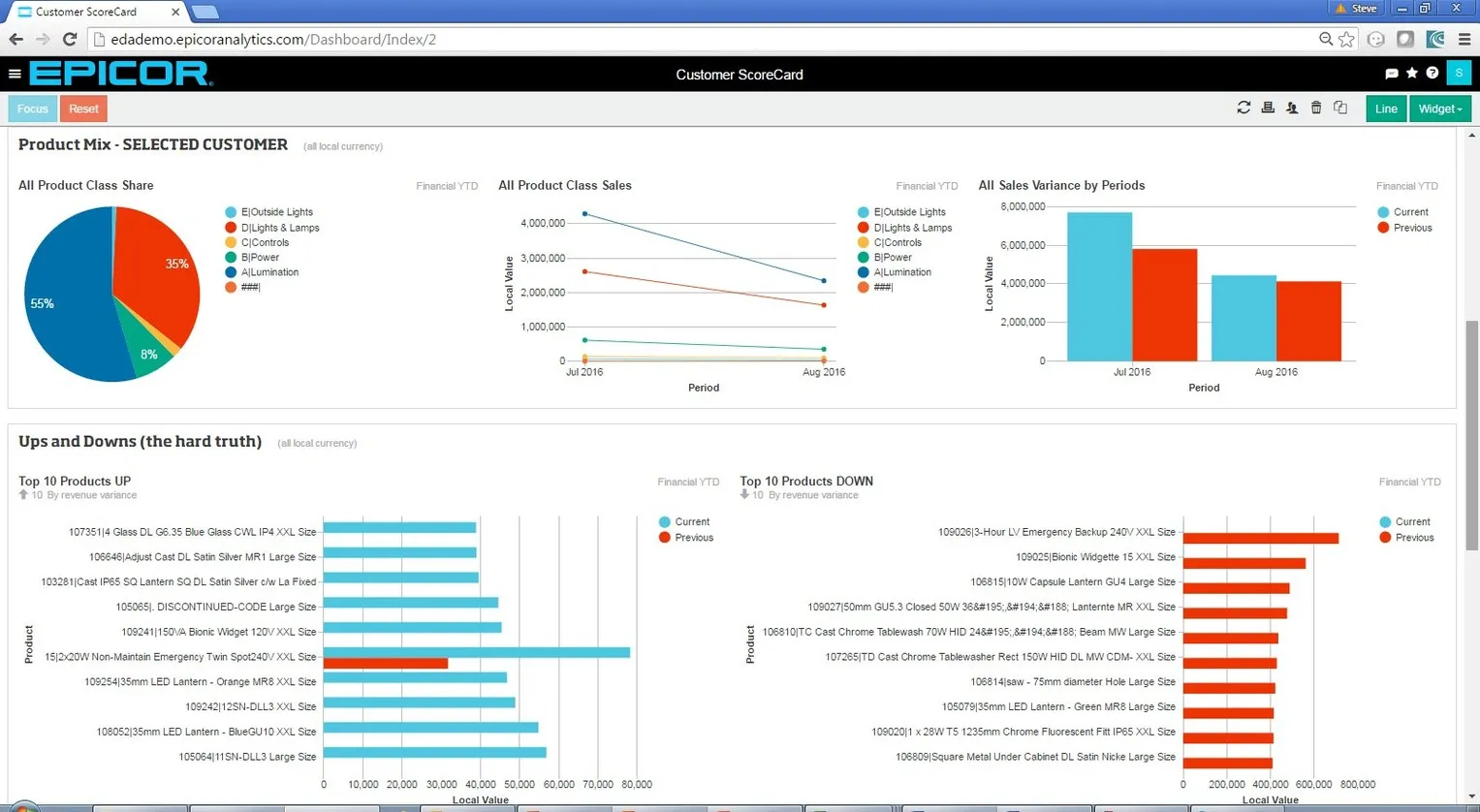 Epicor 10 is a strong choice for manufacturers that require advanced production, inventory, and warehouse features. It also appeals to businesses looking for flexibility in deployment, offering both cloud and on-premise options.
Epicor 10 is a strong choice for manufacturers that require advanced production, inventory, and warehouse features. It also appeals to businesses looking for flexibility in deployment, offering both cloud and on-premise options.
When compared to NetSuite, Epicor’s platform is more fragmented, as it offers multiple products built on different codebases. In contrast, NetSuite operates on a single codebase with one consistent version across all users.
Features:
- Production management
- Inventory tracking
- Warehouse operations
- Supply chain planning
- Financial controls
| Pros | Cons |
|
|
10. Salesforce
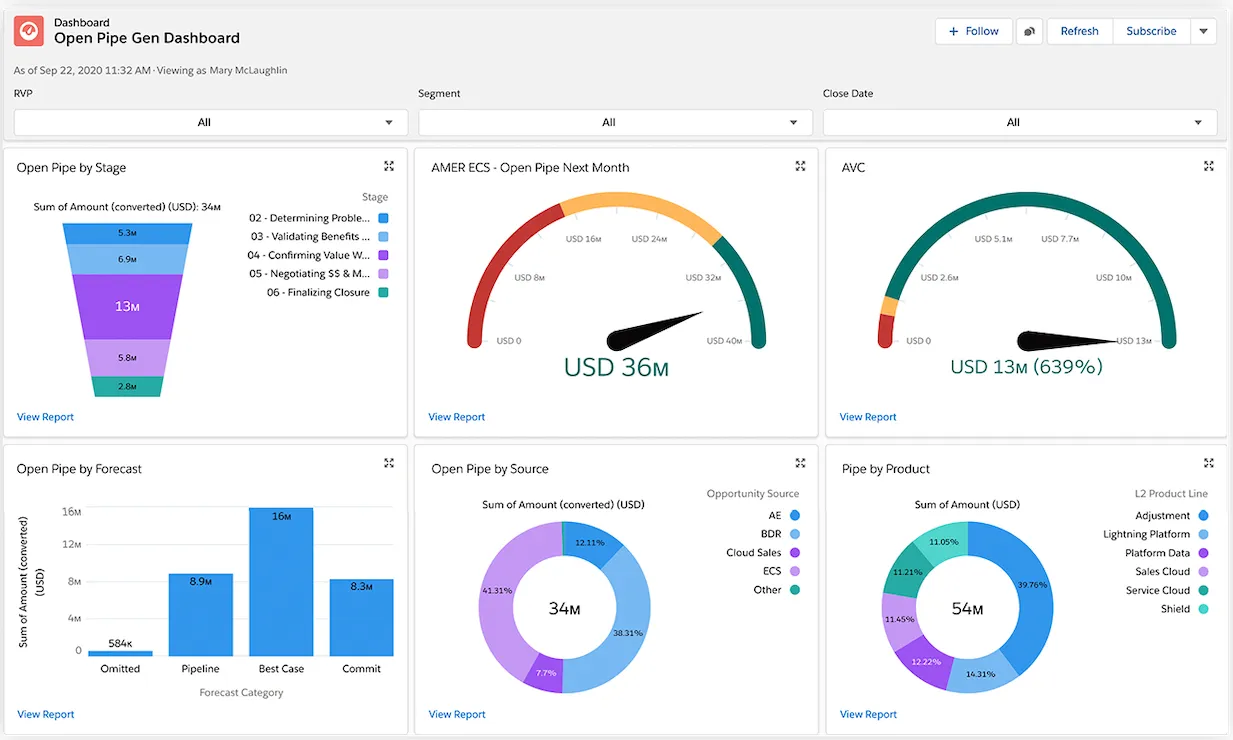 Salesforce is a cloud-based platform best known for its powerful customer relationship management (CRM) tools. Over time, Salesforce has expanded to offer solutions for analytics, app development, and industry-specific workflows.
Salesforce is a cloud-based platform best known for its powerful customer relationship management (CRM) tools. Over time, Salesforce has expanded to offer solutions for analytics, app development, and industry-specific workflows.
While Salesforce is not a full ERP like NetSuite, it offers deep CRM capabilities that often go beyond what NetSuite provides natively. For businesses that prioritize customer engagement, sales automation, and marketing performance, Salesforce can serve as a strong front-office alternative.
Features:
- Lead and contact management
- Sales pipeline tracking
- Opportunity management
Customer support tools - Marketing automation
| Pros | Cons |
|
|
11. IFS Cloud ERP
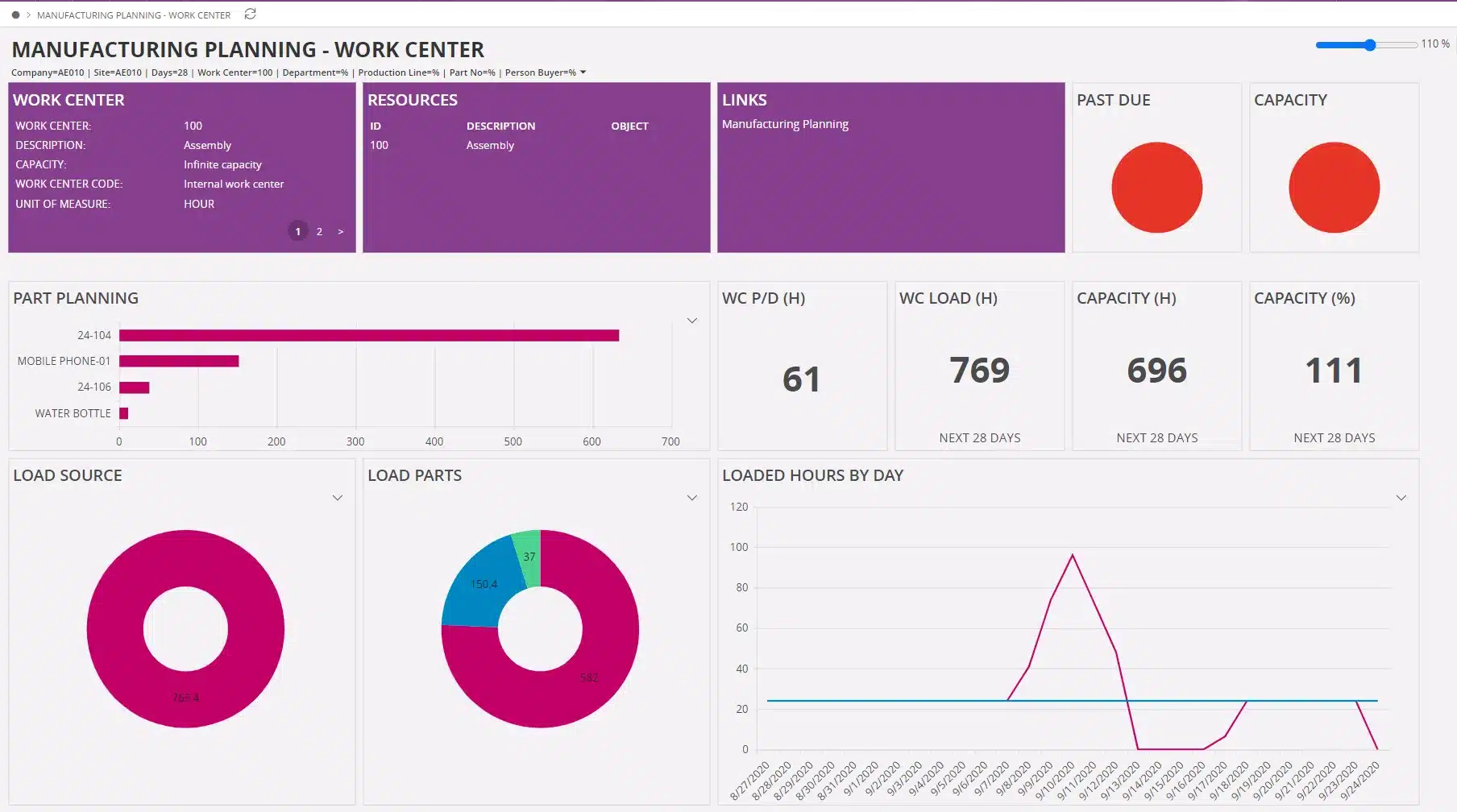 IFS is an ERP software provider based in Europe, recently acquired by EQT, a global investment group. The company has modernized its platform for cloud use and is expanding into the North American market.
IFS is an ERP software provider based in Europe, recently acquired by EQT, a global investment group. The company has modernized its platform for cloud use and is expanding into the North American market.
While both IFS and NetSuite serve manufacturing industries, IFS tends to focus on larger enterprises with more advanced needs, especially those requiring deep asset and service management.
Features:
- Production and manufacturing management
- Enterprise asset tracking
- Field service operations
- Supply chain coordination
- Financial management
| Pros | Cons |
|
|
12. Cin7
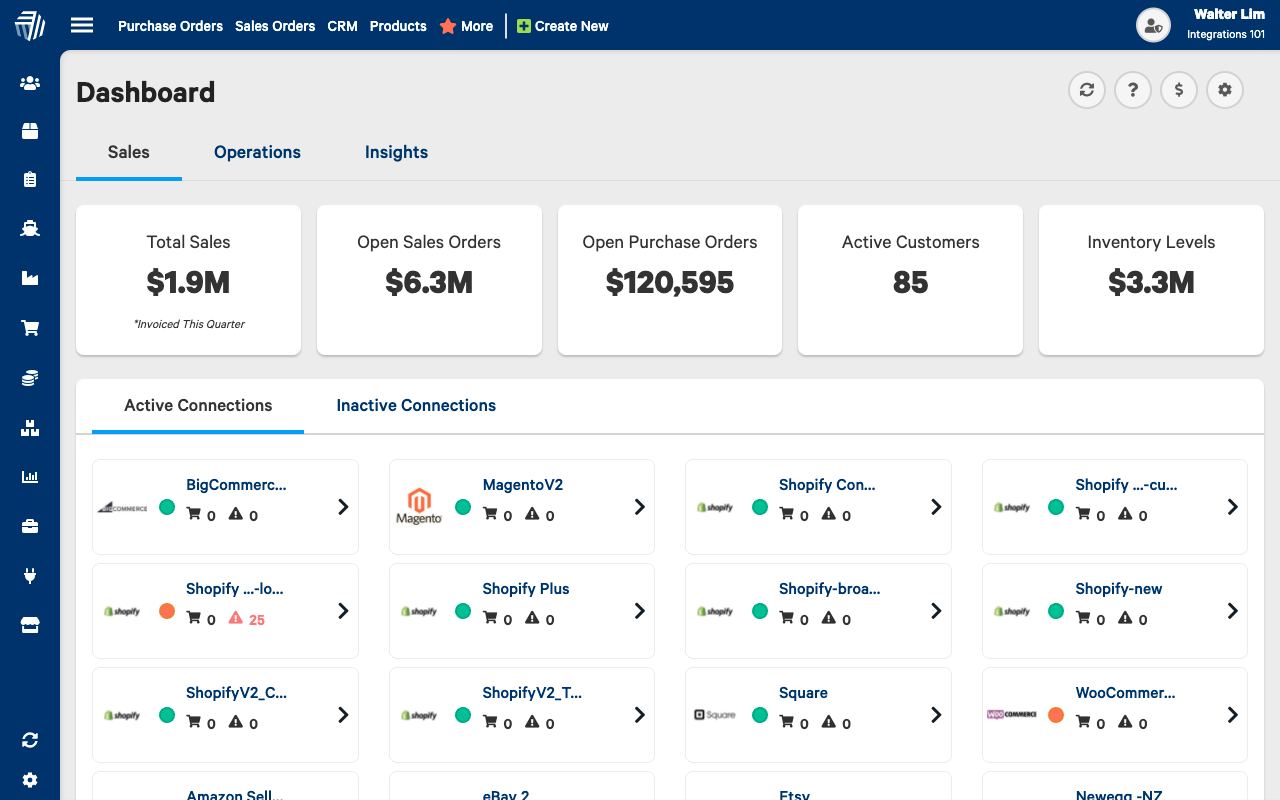 Cin7 provides two inventory solutions that support different operational and business needs. First, Cin7 Core is designed to reduce manual work by automating tasks like stock reordering, data entry, and general inventory control.
Cin7 provides two inventory solutions that support different operational and business needs. First, Cin7 Core is designed to reduce manual work by automating tasks like stock reordering, data entry, and general inventory control.
Then, Cin7 Omni suits small and medium-sized businesses that want a centralized and organized inventory management system.
For companies looking for built-in integrations with EDI and 3PL providers, Cin7 offers a practical alternative to NetSuite. It brings together key areas such as sales, finance, and warehouse operations into one platform.
Features:
- Stock and inventory tracking
- Warehouse operations control
- Data reporting and insights
- Built-in EDI and 3PL integration
| Pros | Cons |
|
|
How to Choose the Ideal NetSuite Alternative
 Not all ERP systems offer the same capabilities. If you’re exploring alternatives to NetSuite, it’s essential to understand which features and functions matter most to your business. Here are five key factors to consider when evaluating ERP solutions:
Not all ERP systems offer the same capabilities. If you’re exploring alternatives to NetSuite, it’s essential to understand which features and functions matter most to your business. Here are five key factors to consider when evaluating ERP solutions:
- Cost: Make sure the pricing fits your company’s budget. Look into available free trials or demos, and account for any extra expenses such as third-party integrations.
- Essential tools: A solid ERP should cover the basics, such as accounting, customer management, and inventory or warehouse tracking.
- Additional capabilities: It’s worth looking for systems that go beyond the basics by offering automation, financial controls, HR tools, or manufacturing support.
- Ease of setup and use: Flexibility in setup, ability to customize, and an intuitive interface can all impact how smoothly a system works for your team.
- Support services: Check what kind of support is offered. Keep in mind that more advanced or priority support options may come at an extra cost.
Finding the best ERP system means choosing a platform that fits your business now and scales with you later.
Conclusion
There are many strong NetSuite alternatives in the Philippines, each offering unique features and pricing models. Choosing the right one depends on your business size, goals, and operational needs.
If you want something flexible, intuitive, and built for growing Philippine businesses, HashMicro ERP is worth considering. From accounting to inventory, it offers everything in one system without the usual setup stress.
With responsive local support, modular features, and fast implementation, HashMicro helps you run smarter, not harder. Book a free demo today and see how it fits your workflow from day one!

FAQ on NetSuite Alternatives
-
What is the typical implementation time for ERP systems compared to NetSuite?
Implementation times for ERP systems can vary significantly. While NetSuite implementations may take several months due to its complexity, some alternatives offer quicker deployment, especially when tailored to specific business needs. The duration often depends on factors like customization requirements and the scale of business operations.
-
How do ERP systems handle multi-entity and multi-currency operations?
Many ERP systems support multi-entity and multi-currency functionalities, but the depth and ease of use can differ. Some platforms provide robust features for managing multiple subsidiaries and currencies, while others might require additional modules or configurations.
-
Do ERP systems offer more transparent pricing models compared to NetSuite?
Pricing transparency varies among ERP providers. Some alternatives to NetSuite offer clear, modular pricing structures, allowing businesses to pay only for the features they need. This can be advantageous for companies seeking to manage costs effectively without unexpected fees.
-
Are there ERP systems that offer better integration with existing tools than NetSuite?
Yes, certain ERP systems are designed with integration flexibility in mind, allowing smoother connections with existing tools and platforms. While NetSuite offers integrations, some businesses find alternatives that provide more straightforward or extensive integration capabilities.





































